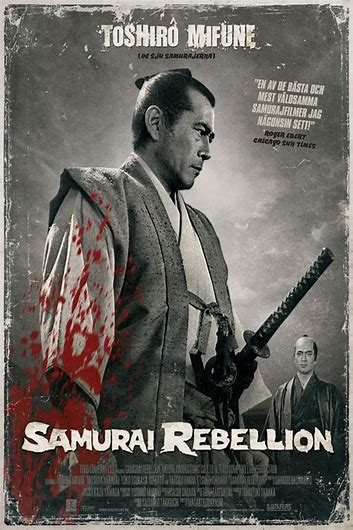Masaki Kobayashi’s Samurai Rebellion
may sound in outline like a rather distanced and hermetic project: a family of
soldiers in the 1770’s, dutifully occupying its designated place within the
clan, is leaned on to betray its morality and instincts for the sake of a whim
of the clan lord, insisting that the family’s oldest son should marry his
discarded mistress; then later, after having accepted and even prospered from
the consequences of that, is asked to bend again when the whims reverse
themselves, and the clan lord wants her back. The film resonates now as a
study of the distorting workings of privilege and self-entitlement; time and
again, concepts of honour and propriety and simple human decency are shown to
be hopelessly malleable, the infrastructure that supposedly supports their
workings incapable of standing up to one man’s lust and ego (hello there, Republicans!). Toshiro Mifune is at his most resonantly moving as the family
head Isaburo, long weighed down by an unhappy marriage but now energized by his
oldest son’s happy one and by becoming a doting grandfather, finding liberation
in looming disaster (even declaring, as things close in, that he’s never felt
so alive). The film is finely sculptured throughout, with any number of
stunning individual shots, wringing a high quotient of nuance and feeling from
the genre’s non-naturalistic conventions. The satisfying ending culminates in a
fatally wounded Isaburo lamenting that he’s failed in his one remaining goal,
to ensure that the story of what happened would be told; the fact that it is
being told by virtue of the film’s existence provides a stray note of hope
among the absurd loss and desolation. Certainly there’s a rather lost in time
quality to the film – a few shots aside, it might as easily have been made in
1947 as in 1967 – but overall, that enhances its searching grandeur.
Thursday, June 15, 2023
Samurai Rebellion (Masaki Kobayashi, 1967)
Subscribe to:
Post Comments (Atom)


No comments:
Post a Comment